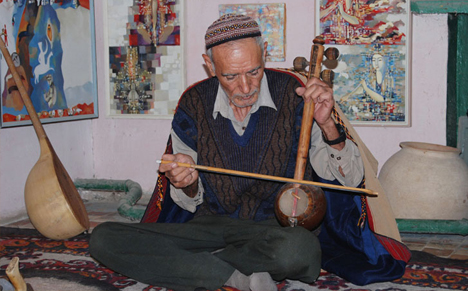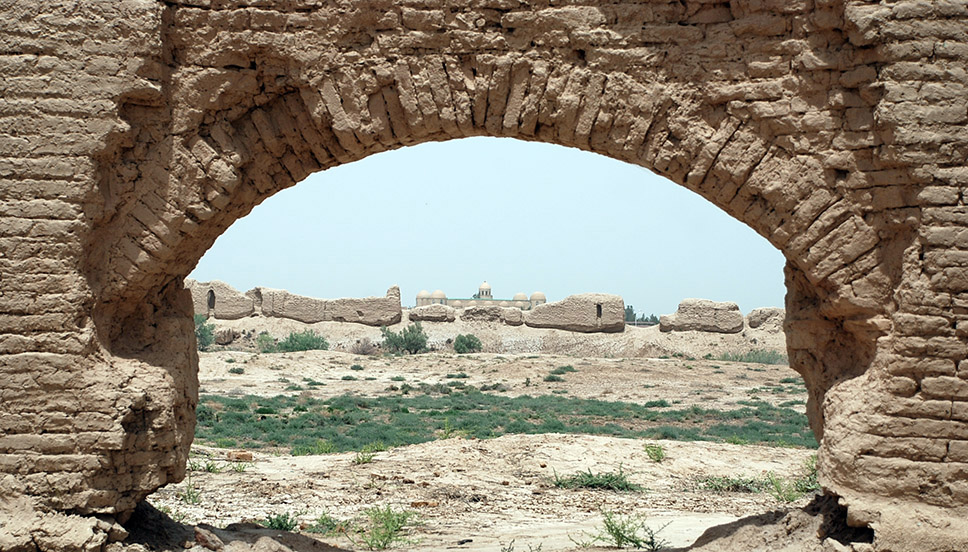Turkic - Turkmen folklore traditions. The bards of the steppe
 Epics are one of the major arts of the Turkic nomad groups. In includes Korkut Ata, Gorogly for Turkmen, Koroghlu for Azeri, Manas for the Kyrgyz, Alpamysh for Uzbeks. Gorogly is the main Turkmen epic, with more than two hundred songs, based on the life of Rushan, a Tekke in early 17th century. As in other epics, the hero represents the values of courage, generosity and loyalty. The story touches on the romantic of Middle Eastern Poetry, moral values, historical references and cultural motifs, such as the value of a horse for Turkmen. This epic is also known in the Caucasus, Turkey and Kurdistan.
Epics are one of the major arts of the Turkic nomad groups. In includes Korkut Ata, Gorogly for Turkmen, Koroghlu for Azeri, Manas for the Kyrgyz, Alpamysh for Uzbeks. Gorogly is the main Turkmen epic, with more than two hundred songs, based on the life of Rushan, a Tekke in early 17th century. As in other epics, the hero represents the values of courage, generosity and loyalty. The story touches on the romantic of Middle Eastern Poetry, moral values, historical references and cultural motifs, such as the value of a horse for Turkmen. This epic is also known in the Caucasus, Turkey and Kurdistan.
The epics presented by bakhshi, traditional singers or roaming minstrels who are sometimes considered shamans, especially in Kazakhstan and Kyrgyzstan. The bakhshi perform music in the evenings or during the celebrations for weddings or circumcisions. Their art has its corpus poems. Transmitted orally, the bakhshi develop and embellish the epics according to their personal interpretation. Turkmen music accompanies them.
The rythms are chosen to illustrate the events of the story, like a racehorse or the romantics of a young girl. The most common musical instrument are the dutar (a kind of mulberry lute with two strings that dates to antiquity), the tuyduk (an oboe reed), the gyjak (a form of fiddle). This art has been traditionally male, but has been partially appropriated by women. Many traditional melodies recorded and transcribed by ethnologists and folklorists.
Bakhshi is a cultural tradition, which is strongly aligned with Central Asia bardic practices found in the culture of the oriental Turkic tribes. The tradition has the roots in the ancient animist and shaminst traditional practices in Central Asia. The meaning of word bakhshi is debated, some believe it derive from Chinese boshi (teacher), while others linked it to the old Turkic verb, meaning - to look carefully or to investigate.
In Turkmenistan, bakhshi referes to a performer who is well respected for the art to sing, play and tell stories (in the form of reciting long narrative songs known as destans). The practice of setting poetry to music is directly related to many of the customs brought to Anatolia by the westward migrations of the Turkmen tribes during the 11th century. There are male and female bakhshi.
The female bakhshi tradition started after 1930. However, that sometimes due to the vocal character of the bakhshi repertoire it is still relatively uncommon to find female bakhshi who can sing in this range. The legendary figure of Dede Korkut, the prototypical Turkic bard, who is venerated as the saint-protector of bakhshi (bagshy) and is the central heroic figure of the eponymous epic tale - The Book of Dede Korkut. In the epic, Dede Korkut is an ozan or shaman-bard, who recounts the history of the pre-Islamic Oghuz group of Turkic tribes – the ancestors of the Turkmen.
